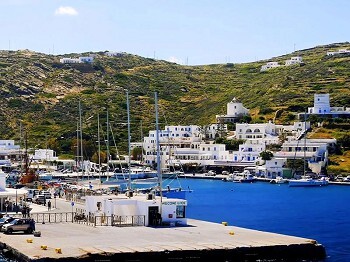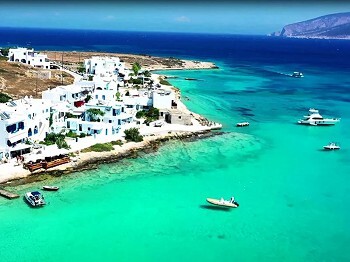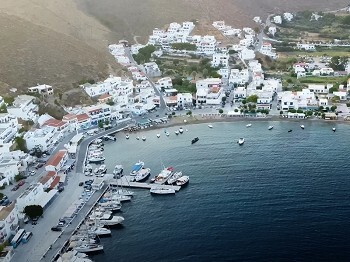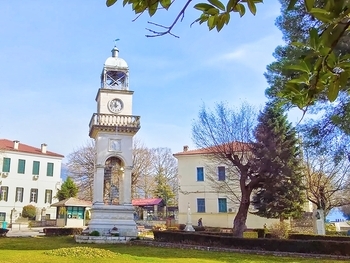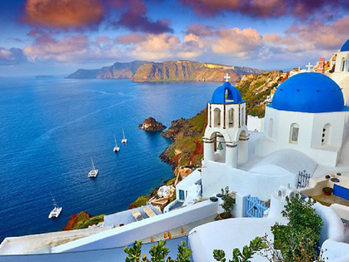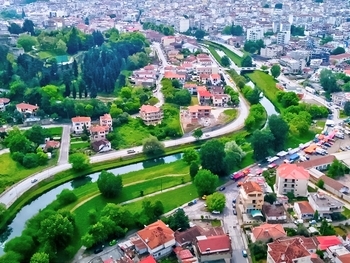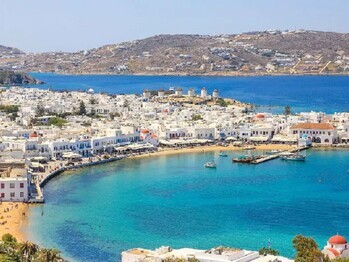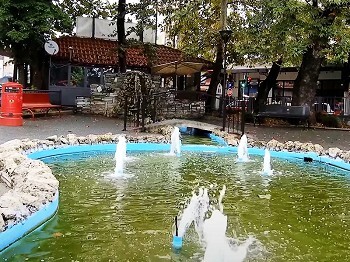Greek island life is deeply intertwined with the ebb and flow of the seasons, marked by a tapestry of saints' days and vibrant religious festivals known as panygeria.
These celebrations are not merely religious observances; they represent a fusion of piety and joy, with Greeks displaying a fervent enthusiasm for festivities ranging from grand national events to intimate village gatherings.
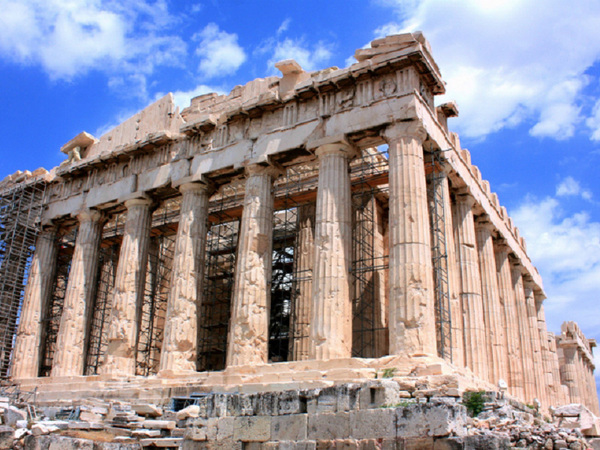
Furthermore, amidst the religious fervor, echoes of ancient pagan rituals persist, adding layers of cultural richness to the festivities. From commemorating bountiful harvests to reenacting historic victories, these festivals encapsulate the spirit of Greek heritage.
SPRING
As the Greek word "anoixi" suggests, spring heralds a season of renewal and anticipation, marking the onset of the bustling tourist season across the islands. With landscapes adorned in vibrant hues of red poppies, delicate camomile, and wild cyclamen, spring paints the islands in their most enchanting light. The air is filled with the sweet fragrance of blooming fruit trees, while freshly painted houses and bustling fishing boats epitomize the islanders' readiness for the influx of visitors.
Notably, Orthodox Easter stands as the crowning event of spring, with southern islands basking in warm, sun-drenched days by late April.
March
In March, the islands come alive with the spirited festivities of Apokries, also known as Carnival Sunday, marking the prelude to Lent with vibrant celebrations spanning several weeks.

Kathari Deftera, or Clean Monday, signals the commencement of Lent, accompanied by traditional rituals such as spring cleaning and the baking of unleavened bread, known as lagana. Meanwhile, the skies above Chalkida on Evvoia become adorned with colorful kites, symbolizing the joyous spirit of the season.
Additionally, Independence Day and Evangelismos on March 25th commemorate Greece's historic struggle for freedom, blending national pride with religious reverence.
April
April ushers in Megali Evdomada, or Holy Week, culminating in the pinnacle of the Orthodox calendar, Pascha, or Easter Sunday.
Furthermore, April 23rd honors Agios Georgios, the patron saint of shepherds, heralding the commencement of the grazing season across Greece.
May
May Day, or Labour Day, on May 1st, is marked by the hanging of wreaths adorned with wild flowers and garlic to ward off malevolent spirits.
Meanwhile, May 21st sees celebrations honoring Agios Konstantinos kai Agia Eleni, paying tribute to the first Orthodox Byzantine rulers.
Lastly, Analipsi, or Ascension, occurring 40 days after Easter, holds significance as a revered Orthodox feast day observed throughout Greece.
CELEBRATING EASTER IN GREECE
Greek Orthodox Easter, a deeply ingrained tradition, showcases a unique blend of religious fervor and cultural heritage. Families unite during Holy Week, offering a glimpse into Greece's rich tapestry of customs and beliefs. This period not only witnesses solemn processions and church services but also presents an opportunity to savor the essence of Greek Easter cuisine. The festivities, echoing Greece's Byzantine legacy, carry traces of ancient pagan rituals, adding layers of significance to the celebration.
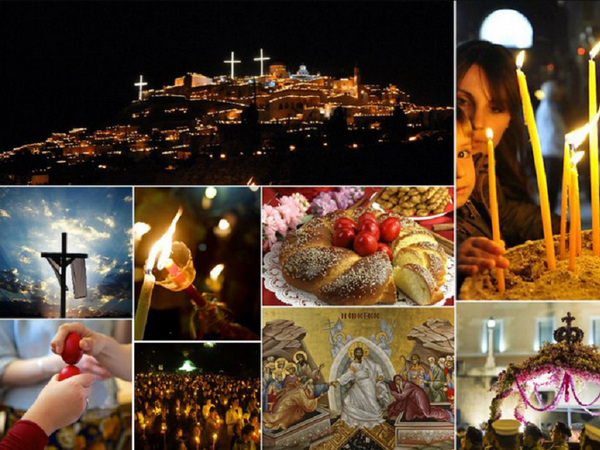
As the clock strikes midnight on Easter Saturday, a symphony of "Christ is risen" resonates, heralding a crescendo of joy marked by fireworks illuminating the night sky. Easter Sunday unfolds into a jubilant affair filled with gastronomic delights, melodious tunes, and spirited dances. The aroma of roast meat permeates the air, symbolizing the end of Lent and the dawn of a vibrant new season.
Venturing to destinations like Olympos in Karpathos, Hydra, Patmos, or any picturesque village in Crete promises an immersive experience during Holy Week. Witnessing candlelit processions and participating in the poignant Friday and Saturday night services offer a profound insight into Greece's spiritual essence.
At the culmination of Easter Saturday Mass, darkness is pierced by the glow of a single flame, igniting a cascade of candlelight symbolizing spiritual unity among worshippers. Egg loaves, intricately braided and adorned with crimson-hued shells, serve as tangible emblems of Christ's sacrifice, while the tradition of exchanging red eggs on Easter Sunday epitomizes the renewal of life.
Indulge in Easter delicacies like the savory mayeritsa soup, crafted from tender lamb innards, savored in the early hours of Easter Sunday. The age-old tradition of lamb roasting over charcoal spits ushers in a festive atmosphere, complemented by the uncorking of the season's first retsina wine. Conclude your feast with delectable cinnamon-infused pastries, a sweet finale to this culinary extravaganza.
SUMMER
As summer unfolds its radiant embrace, Greece's island paradises beckon travelers with promises of sun-kissed adventures. Villagers, adorned with warm hospitality, eagerly welcome the influx of tourists, signaling the onset of a bustling tourist season. Against the backdrop of azure waters, the islands are caressed by the refreshing meltemi winds, offering respite from the summer heat. June witnesses the bountiful harvest of corn and an array of luscious fruits, including cherries, apricots, and peaches.
July heralds the gathering and drying of fragrant herbs, while succulent figs reach their peak of ripeness, tantalizing the taste buds of visitors and locals alike.

June
Pentikosti, observed seven weeks after Orthodox Easter, marks a significant religious observance across Greece. The feast of Agious Pnevmatos, commemorating the Holy Spirit, resonates with nationwide reverence. Meanwhile, the Athens Festival, spanning from mid-June to mid-September, captivates audiences with its eclectic blend of modern and classical arts.
In Chania, Crete, the festival of Klidonas unfolds on June 24th, enveloping the city in joviality as locals engage in the ancient tradition of water-divining. St. John's Day, celebrated on the same date, sees bonfires illuminating the night skies across various islands, evoking a sense of camaraderie among communities.
Communities gather to honor Apostols Peter and Paul on June 29th, with festivities held at dedicated churches like St. Paul's Bay in Lindos, Rhodes. The following day, Agioi Apostoli commemorates the twelve apostles, inviting celebrations for individuals bearing their names.
July
July ushers in a plethora of festivities, each offering a glimpse into Greece's vibrant cultural tapestry. In Naxos town, Agios Nikodimos is honored with a charming folk festival, followed by a procession in reverence to the town's patron saint. Rural areas come alive on July 17th to celebrate Agia Marina, an esteemed protector of crops and healer of snakebites, with feasts echoing throughout Crete and beyond.
The Prophet Elijah is commemorated from July 18th to 20th, with fervent celebrations atop mountain chapels in the Cyclades, Rhodes, and Evvoia. Meanwhile, Tilos resonates with the rhythms of dance and song during the Agiou Panteleimonos festival, spanning from July 25th to 28th.
Kea's Simonideia festival, running from August 1st to 19th, pays homage to the island's revered poet, Simonides, through a medley of drama, exhibitions, and dance performances. Rethymno, Crete, comes alive with the vibrant Rethymno festival, offering a blend of wine festivities and Renaissance-inspired revelry.
August
Immerse yourself in the vibrant cultural scene of the Greek islands during August. The Ippokrateia, Hippocrates Cultural Festival, held throughout the month in Kos, offers a blend of art exhibitions, concerts, films, and the solemn ceremony of the Hippocratic Oath at the Asklepion.
Join the lively festivities of the Dionysia Festival in Naxos town during the first week of August. Revel in traditional folk dancing, adorned in authentic costumes, while indulging in free food and copious amounts of wine shared by locals.
Experience the unique celebration of Metamorfosi, the Transfiguration of Christ, on August 6th. Across the Orthodox calendar, this day holds significance and is especially lively in the Dodecanese, particularly on Chalki Island, where you might find yourself playfully adorned with eggs, flour, yogurt, and squid ink.
Observe the Koimisis tis Theotokou, the Assumption of the Virgin Mary, on August 15th, a national holiday and one of the most significant festivals in the Orthodox calendar. Witness the solemn liturgy followed by joyful processions, traditional music, and spontaneous dancing, offering a glimpse into the rich cultural heritage of the Greek islands.
AUTUMN
As autumn sets in, September and October bring warm days ideal for wine-making in the Dodecanese, Crete, and the Cyclades. Meanwhile, farther north, occasional showers and rough seas punctuate the landscape. October introduces the "little summer of St. Dimitrios," a delightful heatwave marking the season, along with the debut of the year's first wines.
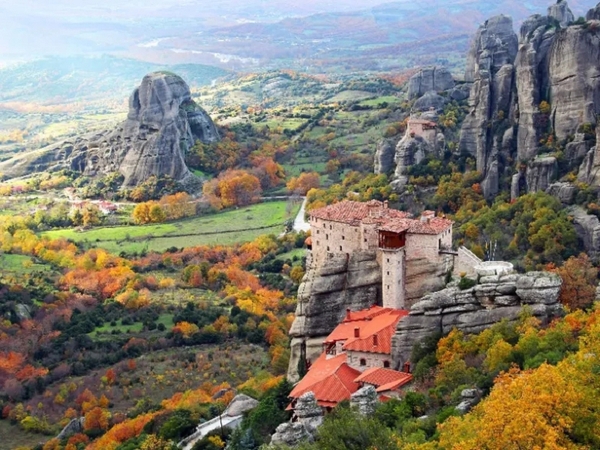
Venture into the hills as the shooting season commences, with hunters seeking pigeon, partridge, and other game. Restaurants start featuring freshly caught fish like bream and red mullet, signaling the onset of the main fishing season. By late October, islanders bid farewell to the islands, heading towards Athens and exchanging wishes of Kalo Chimona, anticipating the winter ahead.
Embrace the timeless rhythms of traditional island life, where olive harvesting, drying strings of garlic, onions, and tomatoes, and tending to flocks of sheep continue unabated. The season also calls for the mending of fishing nets, preserving age-old customs and practices.
September
Celebrate the Gennisis tis Theotokou, the birth of the Virgin Mary, on September 8th, a significant feast day in the Orthodox calendar.
Partake in the festivities of the Ypsosis tou Timiou Stavrou, the Exaltation of the True Cross, on September 14th, marking the culmination of Greece's summer festivals, particularly vibrant on Chalki Island.
October
Join the revelry of Agios Dimitrios on October 26th, a popular name day celebrated with the first sip of the year's wine.
Commemorate Ochi Day on October 28th, a pivotal national holiday honoring Greece's resilience and refusal to surrender to Mussolini's demands, marked by patriotic parades and spirited dancing across the country.
November
Pay homage to Ton Taxiarchon Michail kai Gavriil on November 8th, with ceremonies held at monasteries dedicated to Archangels Gabriel and Michael, such as Panormitis on Symi Island, a revered name day nationwide.
Observe Eisodia tis Theotokou, the Presentation of the Virgin in the Temple, on November 21st, a cherished religious feast day in the Greek Orthodox tradition, also commemorating the name day of Maria and Mary.
WINTER
Embrace the raw beauty of winter in the Greek islands, where gusty winds and turbulent seas contrast with cozy tavernas filled with locals engaged in card games and crafts. Women busy themselves with embroidery and crochet while preparing hearty soups and stews, marking the onset of the festive season.
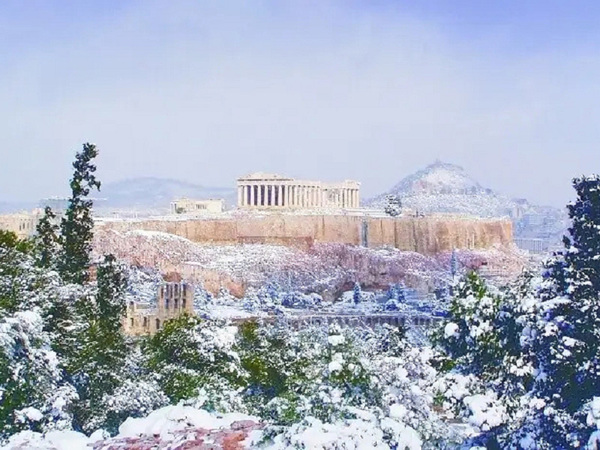
Enter into the festive spirit as the 12-day celebration from Christmas eve to the Epiphany unfolds, with mischievous goblins, kallikantzaroi, lurking about until they are banished in the new year. Enjoy the tradition of Christmas pork and symbolic cakes representing the infant's swaddling clothes. Welcome the Greek Father Christmas on New Year's Day, and savor special vasilopita cakes, hoping to find a coin for good luck.
December
Honor Agios Nikolaos on December 6th, the patron saint of sailors, with solemn panigyyria held at harborside churches and adorned boats parading along the coast.
Join the festivities of Agios Spyridon on December 12th in Corfu, celebrating the patron saint of the island with grand processions showcasing his relics.
Mark Christougenna, Christmas, on December 25th, a national holiday celebrated with reverence across Greece, albeit overshadowed by the grandeur of Easter festivities.
Observe Synaxis tis Theotokou, the meeting of the Virgin's entourage, on December 26th, a solemn religious celebration accompanied by a popular name day for Stefanos and Stefania.
January
Welcome the new year with celebrations for Agios Vasileios, also known as Protochronia, on January 1st, a national holiday marked by gift exchanges and well wishes of Kali Chronia.
Participate in the Theofania, or Epiphany, on January 6th, an essential feast day celebrated nationwide with special ceremonies blessing the waters at coastal locales, followed by the exhilarating tradition of diving for the cross.
February
Join in the festivities of Ypapanti, Candlemas, on February 2nd, a significant Orthodox feast day honoring the presentation of the infant Christ at the temple, observed with reverence across Greece.
MAIN PUBLIC HOLIDAYS
Planning a visit? Be aware of these upcoming nationwide closures for public sites.
Agios Vasileios (1 Jan)
Evangelismos (25 March)
Protomagia (1 May)
Megali Paraskevi (Good Friday)
Pascha (Easter Sunday)
Christougenna (25 Dec)
Synaxis tis Theotokou (26 Dec)
NAME DAYS
In the cultural tapestry of Greece, birthdays take a back seat to a unique celebration known as the name day (giorti). Rooted in tradition, Greeks commemorate the feast day of the saint they were named after at baptism, marking a cherished tradition that extends far beyond mere calendar dates. The significance of names in Greek culture is profound, often serving as a tribute to ancestors or drawing from the rich tapestry of Greek history and mythology.
On the auspicious occasions of St. George's day or St. Helen day (21 May), Greece radiates with jubilance as communities come together in celebration. It's a time of heartfelt exchanges, as guests arrive bearing thoughtful gifts, only to be met with warm hospitality in the form of delectable cakes and tantalizing liqueurs. When a friend's name day is upon them, the air is filled with the joyous declaration, "Giortazi simera" (I'm celebrating today), to which the traditional response resounds, "Chronia polla" (many years). Today, the modern Greek experience intertwines these cherished name day customs with the more widespread observance of birthdays, embracing both with equal enthusiasm and reverence.
